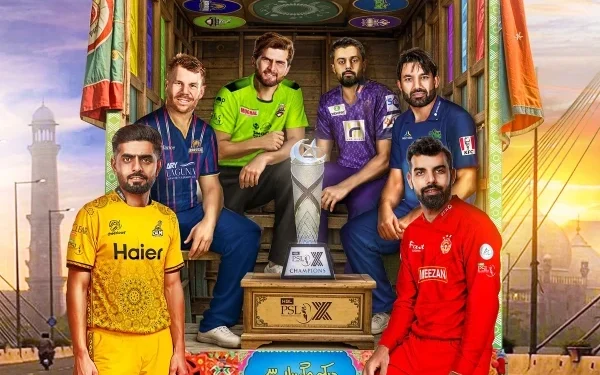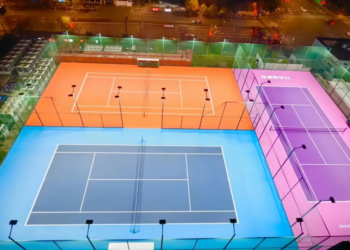The 11th edition of the Pakistan Super League (PSL) is poised to bring about significant changes across several dimensions of the tournament—from sponsorship deals and franchise ownerships to scheduling shifts and the possible addition of new teams. As preparations begin to take shape behind the scenes, the upcoming season is expected to redefine how the country’s premier T20 league operates, both domestically and on the international stage.
Scheduling Conflict and New Window: PSL 11 Likely to Be Held in April-May
One of the most critical updates surrounding PSL 2026 is the potential scheduling of the tournament in the April-May window, similar to the 10th edition, instead of its traditional slot in February-March. This change comes as a result of the ICC T20 World Cup 2026, which is scheduled to be played during February and March, thereby creating a clash with PSL’s usual timeframe.
To avoid this overlap, the Pakistan Cricket Board (PCB) is likely to shift the PSL window again to April-May, which will coincide with the Indian Premier League (IPL)—the most commercially dominant T20 league globally. Although overlapping with the IPL poses challenges, the successful execution of PSL 10 in the same timeframe has eased some concerns among franchises and stakeholders.
Zimbabwe Series May Be Rescheduled
The new scheduling plans have a ripple effect on Pakistan’s existing cricket calendar. Notably, the home series against Zimbabwe, originally expected to take place around April-May, may need to be rescheduled.
Earlier, there were suggestions to move PSL 11 to December-January, but stakeholders pointed out the logistical difficulties of organizing such a high-profile event during that window. These included short preparation time, player availability issues, and tight weather constraints, particularly in the colder regions of Pakistan.
Franchise Valuation to Increase Post-PSL 10
With the completion of PSL 10, the valuation of the existing six franchise teams is now due for reassessment. Industry insiders suggest that the value of each team could increase by up to 25%, thanks to the league’s growing popularity, improved broadcasting deals, and higher brand equity.
In December 2024, all six franchise owners submitted written confirmations to retain their ownership. However, Multan Sultans’ owner, Ali Tareen, publicly expressed concerns over financial losses, casting some uncertainty over whether he would continue or consider re-bidding for the team.
Tareen, who had taken over the Sultans after a turbulent ownership history, has remained silent since the conclusion of the 10th edition, leaving room for speculation. The Multan Sultans are currently the most expensive franchise, reportedly paying over one billion Pakistani rupees annually.
Addition of Two New Teams Still in Limbo
The PCB had previously announced plans to expand the PSL from six to eight teams starting from the 11th edition. However, there has been no significant progress on this front so far. Key decisions regarding the cities, ownership, and financial models for the two new teams remain undecided.
Sources from existing franchises say that no formal discussions have been held yet about the financial framework for the new teams. There’s uncertainty about whether these franchises will be offered a revenue-sharing model similar to the current ones or if a new system will be introduced.
Should the league expand to eight teams, the number of matches will rise from 34 to 54, which will not only demand extended venue logistics but will also boost the value of broadcasting and sponsorship contracts by an estimated 30%.
Key Sponsorship and Broadcast Contracts Await Renewal
Several critical commercial agreements are set to expire before PSL 11, which makes the next few months vital for the PCB’s financial planning. These include:
- 10-year title sponsorship deal
- Ground sponsorships (8–10 categories)
- Domestic and international broadcast contracts
- Live streaming rights
- TV production contracts
Last year’s commercial earnings underscore the scale of the league’s growing market:
- Pakistan’s live streaming rights were sold for approximately Rs. 1.8 billion
- Local broadcast rights fetched nearly $6.3 million
- International broadcasting rights brought in around $4.6 million
- Ground sponsorships were valued at $2 billion for two years
- The TV production contract was signed at $2.25 million annually
Currently, the PCB earns around Rs. 900 million annually from the title sponsorship alone.
These figures are likely to increase if new teams are added, and the league continues to show growth in viewership and marketability.
Broadcasters Concerned About IPL Overlap
While franchises are becoming more open to hosting PSL alongside the IPL, the same cannot be said for broadcasters and global rights holders. Given the IPL’s dominant market presence, especially in South Asia, there are legitimate concerns that PSL viewership and advertising revenues may be diluted if both tournaments run concurrently.
Despite this, PSL 10’s overlap with IPL didn’t lead to a significant dip in fan engagement or brand visibility, which may provide the PCB with the confidence to retain the April-May window. However, final decisions are pending and are expected to be discussed in the next PSL Governing Council meeting, the invitation for which was sent before the Eid holidays.
PSL Governing Council Meeting Expected Post-Eid
The PCB has circulated a joint email to franchise owners calling for a meeting of the PSL Governing Council to deliberate on these pressing matters. The board is awaiting responses, which are likely to come after Eid-ul-Adha holidays.
Important topics to be discussed in the meeting include:
- Finalizing the schedule for PSL 11
- Discussion on new franchises
- Revenue-sharing model updates
- Sponsorship and media rights tenders
The decisions made in this meeting will be crucial in shaping the commercial and structural future of the league.
Conclusion: PSL 11—A Potential Turning Point for Pakistan Cricket
The 11th edition of the Pakistan Super League stands at a crossroads. With the prospect of new teams, revised scheduling, massive commercial deals, and franchise re-evaluations, PSL 11 could mark the most transformative phase in the league’s history.
While uncertainties remain—particularly around new team inclusion, broadcast rights, and IPL scheduling conflicts—the groundwork laid during PSL 10 provides a robust foundation to build upon.
As the PCB, franchises, and stakeholders gear up for key negotiations and decisions, one thing is certain: PSL 11 will change many things—the only question that remains is, who will lead this change?

























